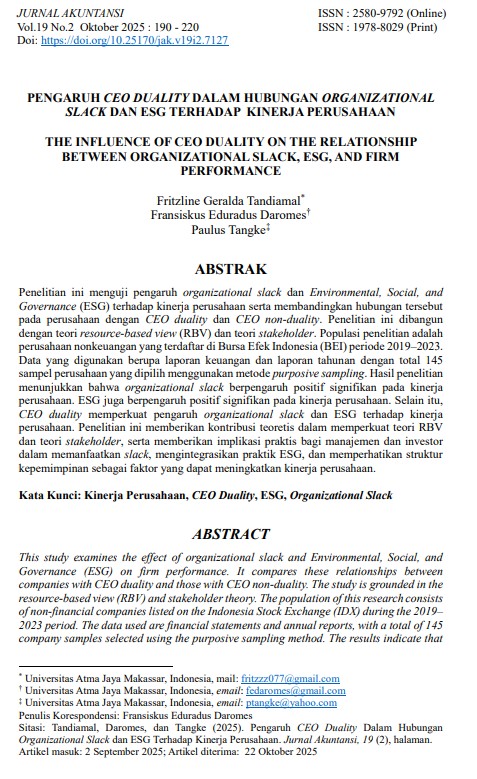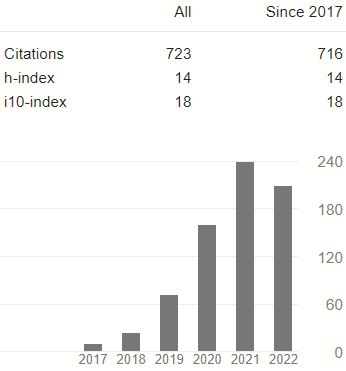THE INFLUENCE OF CEO DUALITY ON THE RELATIONSHIP BETWEEN ORGANIZATIONAL SLACK, ESG, AND FIRM PERFORMANCE
DOI:
https://doi.org/10.25170/jak.v19i2.7127Keywords:
Firm Performance, CEO Duality, ESG, Organizational SlackAbstract
This study examines the effect of organizational slack and Environmental, Social, and Governance (ESG) on firm performance. It compares these relationships between companies with CEO duality and those with CEO non-duality. The study is grounded in the resource-based view (RBV) and stakeholder theory. The population of this research consists of non-financial companies listed on the Indonesia Stock Exchange (IDX) during the 2019–2023 period. The data used are financial statements and annual reports, with a total of 145 company samples selected using the purposive sampling method. The results indicate that organizational slack has a positive and significant effect on firm performance. ESG also has a positive and significant effect on firm performance. In addition, CEO duality strengthens the effect of both organizational slack and ESG on firm performance. This research provides theoretical contributions by reinforcing the RBV and stakeholder theory, as well as practical implications for management and investors in leveraging slack, integrating ESG practices, and considering leadership structure as a factor that can improve firm performance.
References
Akbar, I., & Setiana, S. (2024). The role of financial flexibility: ESG performance, roa and firm value. Dinasti International Journal of Economics, Finance & Accounting (DIJEFA), 5(3). 10.38035/dijefa.v5i3.2924
Alves, S. (2023). CEO Duality, earnings quality and board independence. Journal of Financial Reporting and Accounting, 21(2), 217-231. https://doi.org/10.1108/JFRA-07-2020-0191
Ardina, A. K., & Novita, N. (2023). Pengungkapan intellectual capital, corporate governance dan risk management terhadap peningkatan kinerja perusahaan. Jurnal Akuntansi, 12(1), 28-45.
Chen, S., Song, Y., & Gao, P. (2023). Environmental, social, and governance (ESG) performance and financial outcomes: Analyzing the impact of ESG on financial performance. Journal of environmental management, 345, 118829. https://doi.org/10.1016/j.jenvman.2023.118829
Deep, G. (2023). Strategic decision-making: A crucial skill for business managers. World Journal of Advanced Research and Reviews, 20(3), 1639-1643. 10.30574/wjarr.2023.20.3.2463
Deloof, M. (2003). Does working capital management affect profitability of Belgian firms?. Journal of business finance & Accounting, 30(3‐4), 573-588. https://doi.org/10.1111/1468-5957.00008
Dixit, K., Manna, R., & Singh, A. (2024). The Effects of CEO duality, board size, and informal social networks on sustainable innovation and firm performance. Corporate Ownership and Control, 21(2), 165-177. https://doi.org/10.22495/cocv21i2art13
Dos Reis Cardillo, M. A., & Basso, L. F. C. (2025). Revisiting knowledge on ESG/CSR and financial performance: A bibliometric and systematic review of moderating variables. Journal of Innovation & Knowledge, 10(1), 100648.
Durlista, M. A., & Wahyudi, I. (2023). Pengaruh pengungkapan environmental, social dan governance (ESG) terhadap kinerja perusahaan pada perusahaan sub sektor pertambangan batu bara periode 2017-2022. Jurnal Ilmiah Manajemen, Ekonomi, & Akuntansi (MEA), 7(3), 210-232.
Dutta, D. K., Malhotra, S., & Zhu, P. (2016). Internationalization process, impact of slack resources, and role of the CEO: The duality of structure and agency in evolution of cross-border acquisition decisions. Journal of World Business, 51(2), 212-225. https://doi.org/10.1016/j.jwb.2015.07.001
Eccles, R. G., Ioannou, I., & Serafeim, G. (2014). The impact of corporate sustainability on organizational processes and performance. Management science, 60(11), 2835-2857. https://doi.org/10.1287/mnsc.2014.1984
Elianto, A. D., Arfinto, E. D., & Januardi, N. V. (2023). The impact of environmental, social, and governance (ESG) on return on assets (ROA)(cross-country evidence of the energy sector in 2019-2021). Diponegoro Journal of Management, 12(2).
Falah, L. J., Mita, A. F., & Akuntansi, D. (2020). Peran narsisme CEO terhadap pengungkapan ESG di negara ASEAN-5. Jurnal Riset Akuntansi Dan Keuangan, 8(2). 10.17509/jrak.v8i2.26367
Friede, G., Busch, T., & Bassen, A. (2015). ESG and financial performance: aggregated evidence from more than 2000 empirical studies. Journal of sustainable finance & investment, 5(4), 210-233. https://doi.org/10.1080/20430795.2015.1118917
Gaol, W. N. A. L., Soeratin, H. Z., & Miftah, M. (2024). Manajemen strategis di bawah kerangka kerja ESG: meningkatkan keberlanjutan perusahaan dan kepercayaan pemangku kepentingan. Accounting Student Research Journal, 3(2), 136-143. https://doi.org/10.62108/asrj.v3i2.8384
Hartomo, H. M., & Adiwibowo, A. S. (2023). Pengaruh pengungkapan environmental, social, governance (ESG) terhadap kinerja perusahaan (Studi empiris pada perusahaan manufaktur yang terdaftar di Bursa Efek Indonesia tahun 2016-2021). Diponegoro Journal of Accounting, 12(4).
Hassan, M. K., Houston, R., Karim, M. S., & Sabit, A. (2023). CEO duality and firm performance during the 2020 coronavirus outbreak. The Journal of Economic Asymmetries, 27, e00278. https://doi.org/10.1016/j.jeca.2022.e00278
Ju, M., & Zhao, H. (2009). Behind organizational slack and firm performance in China: the Moderating roles of ownership and competitive intensity. Asia Pacific Journal of Management, 26(4), 701–717. doi:10.1007/s10490-009-9148-1
Krause, R., Semadeni, M., & Cannella Jr, A. A. (2014). CEO duality: A review and research agenda. Journal of Management, 40(1), 256-286. https://doi.org/10.1177/0149206313503013
Lubis, N. W. (2022). Resource based view (RBV) in improving company strategic capacity. Research Horizon, 2(6), 587-596. https://doi.org/10.54518/rh.2.6.2022.587-596
Maharani, N. P. R., & Kurnia, K. (2024). Pengaruh kinerja keuangan dan pertumbuhan perusahaan terhadap nilai perusahaan. Jurnal Ilmu dan Riset Akuntansi (JIRA), 13(3).
Mallorca, E. L., & Manansala, L. D. (2025). The impact of ESG on the performance of Philippine-listed firms: the Role of audit quality and CEO duality. Management, 10(1), 172-191. 10.32535/ijabim.v10i1.3760
Mao, Y., Li, P., & Li, Y. (2023). The relationship between slack resources and organizational resilience: The moderating role of dual learning. Heliyon, 9(3). https://doi.org/10.1016/j.heliyon.2023.e14044
Melinda, A., & Wardhani, R. (2020). The effect of environmental, social, governance, and controversies on firms’ value: Evidence from Asia. In Advanced issues in the economics of emerging markets (pp. 147-173). Emerald Publishing Limited. https://doi.org/10.1108/S1571-038620200000027011
Muharam, D. R. (2017). Penerapan konsep resources-based view (RBV) dalam upaya mempertahankan keunggulan bersaing perusahaan. Jurnal Ilmu Administrasi: Media Pengembangan Ilmu Dan Praktek Administrasi, 14(1), 82-95. https://doi.org/10.31113/jia.v14i1.4
Paeleman, I., & Vanacker, T. (2015). Less is more, or not? On the interplay between bundles of slack resources, firm performance and firm survival. Journal of Management Studies, 52(6), 819-848. https://doi.org/10.1111/joms.12135
Peng, M. W., Li, Y., Xie, E., & Su, Z. (2010). CEO duality, organizational slack, and firm performance in China. Asia Pacific Journal of Management, 27(4), 611-624. https://doi.org/10.1007/s10490-009-9161-4
Prasti, T. V., Bararoh, T., & Inayati, T. (2022). The effect of family ownership and CEO duality on company performance with political connections as moderator variables. Journal of Industrial Engineering & Management Research, 3(4), 236-242. https://doi.org/10.7777/jiemar.v2i3
Pratama, F. G. C. (2020). Pengaruh CEO duality terhadap firm performance dengan political connection sebagai variabel moderasi (Doctoral dissertation, Universitas Airlangga).
Pusung, R. (2014). Analisis hubungan antara pengukuran kinerja, strategi dan kinerja perusahaan. Going Concern: Jurnal Riset Akuntansi, 9(3).
Rau, D., Flores, L., & Simha, A. (2021). A moderated-mediated examination of the relations among strategic planning, organizational learning, slack and firm performance. Management Decision, 59(9), 2200-2216. https://doi.org/10.1108/MD-02-2020-0171
Shrivastav, S. M., & Kalsie, A. (2016). The relationship between CEO Duality and firm performance: An analysis using panel data approach. IUP Journal of Corporate Governance, 15(2).
Vanacker, T., Collewaert, V., & Zahra, S. A. (2017). Slack resources, firm performance, and the institutional context: Evidence from privately held E uropean firms. Strategic management journal, 38(6), 1305-1326. https://doi.org/10.1002/smj.2583
Velte, P. (2020). Does CEO power moderate the link between ESG performance and financial performance? A focus on the German two-tier system. Management Research Review, 43(5), 497-520. https://doi.org/10.1108/MRR-04-2019-0182
Wang, D., Sun, D., Yu, X., & Zhang, Y. (2014). The impact of CEO Duality and ownership on the relationship between organisational slack and firm performance in China. Systems Research and Behavioral Science, 31(1), 94-101. https://doi.org/10.1002/sres.2172
Wooldridge, J.M. (2016). Wooldridge, J. M. (2016). Introductory econometrics a modern approach. South-Western cengage learning.
Xu, Z. (2023). CEOs’ early famine experience, managerial discretion and corporate social responsibility. Humanities and Social Sciences Communications, 10(1), 1-13. https://doi.org/10.1057/s41599-023-02192-x

Downloads
Published
Issue
Section
License
Copyright (c) 2025 Fritzline Geralda Tandiamal, Fransiskus E. Daromes, Paulus Tangke

This work is licensed under a Creative Commons Attribution-ShareAlike 4.0 International License.
Authors who publish with this journal agree to the following terms:
- Authors retain copyright and grant the journal right of first publication with the work simultaneously licensed under a Creative Commons Attribution-ShareAlike 4.0 International License that allows others to share the work with an acknowledgment of the work's authorship and initial publication in this journal.
- Authors are able to enter into separate, additional contractual arrangements for the non-exclusive distribution of the journal's published version of the work (e.g., post it to an institutional repository or publish it in a book), with an acknowledgment of its initial publication in this journal.
- Authors are permitted and encouraged to post their work online (e.g., in institutional repositories or on their website) prior to and during the submission process, as it can lead to productive exchanges, as well as earlier and greater citation of published work.














